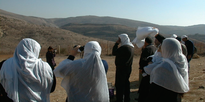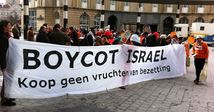10 mar 2017

A wide coalition of Palestinian and international organisations denounced FIFA president Gianni Infantino’s failure to compel Israel’s national football league to exclude six football teams based in illegal Israeli settlements and called for the dissolution of the FIFA Monitoring Committee Israel-Palestine.
FIFA’s failure to act against the Israeli settlement clubs renders it complicit in Israel’s violations of international law, and violates its own rules, which forbid member associations from playing in the territory of another member association without the latter’s permission.
The FIFA Monitoring Committee Israel-Palestine, established in May 2015 and chaired by Tokyo Sexwale, was due to submit its report to the FIFA Council in October 2016. Israeli government officials have pressured the committee to soften its recommendations and prevent the exclusion of Israeli settlement clubs from its leagues.
Despite promises of accountability, it seems that FIFA has bowed to Israeli pressure and is delaying the publication of its committee’s report indefinitely, therefore making more difficult action on the issue in the upcoming FIFA Congress in May 2017.
Sharaf Qutaifan, from the Palestinian Campaign for the Academic and Cultural Boycott of Israel (PACBI), said, “The FIFA Monitoring Committee Israel-Palestine has failed to deliver on its mandate and should be dissolved. FIFA and the committee have bowed to political pressure, refusing to take meaningful action to end the Israeli Football Association’s violation of FIFA statutes.
FIFA is breaching its own duty of neutrality and is discriminating against Palestine. Infantino has abandoned his promise to make a clean break from the corruption of his predecessor Sepp Blatter, and has instead followed in his footsteps.”
The Palestinian Football Association, Palestinian and international campaigners, Human Rights Watch, lawmakers and the UN Special Adviser on Sport for Development and Peace Wilfried Lemke have long urged FIFA to ensure that football teams based in illegal Israeli settlements are excluded from Israeli football leagues. They have asked FIFA to suspend the Israeli Football Association (IFA) if it refuses to comply. Almost ten thousand football fans wrote to FIFA President Gianni Infantino last month demanding urgent action on Israeli settlements, but FIFA has failed to act.
Kwara Kekana of BDS South Africa said, “South Africans know too well how ‘constructive engagement’ helped perpetuate apartheid and the suffering of black South Africans. Similarly, the false premise of the FIFA Monitoring Committee Israel-Palestine is that the parties can talk the issues out, but there is no middle ground when it comes to international law and FIFA’s own rules. FIFA must end this sham process of committees or face widespread protest and condemnation for its double-standards.”
Dr. Geoffrey Lee, coordinator of Red Card Israeli Racism, said, “It’s hard to see a logical reason for delaying the decision on Israel’s illegal settlements’ clubs and Israel’s persistent attacks against Palestinian football. FIFA statutes are crystal clear. This is yet another instance of Israel’s political bullying tactics to deny Palestinian human rights.”
In 2014 Gianni Infantino, then the General Secretary of the Union of European Football Associations (UEFA), the governing body of football in Europe, banned clubs in the annexed Crimea region from playing in competitions in Russia.
Raffaele Spiga, a human rights campaigner based in Bologna, and member of BDS Italy, said, “We are seeing a double standard applied by Infantino. He talks about protecting football from political interference but he is making the issue of Israeli settlement clubs political instead of just applying FIFA’s own rules. His reluctance to act brings football into disrepute.”
Roman Vonwil, a Palestine solidarity activist based in Bern, and member of BDS Switzerland, said, “We will continue to raise the issue of Israeli attacks on Palestinian football at every possible opportunity. FIFA is legitimising settlements, considered war crimes under international law, and is allowing for racism and discrimination to persist in football, contradicting Infantino’s promise to clean-up the game.”
The Red Card Israel Campaign has spread to the Arab countries holding a seat at the FIFA Council, with fans demanding their federations propose a resolution demanding Israel’s suspension.
Batoul Al Mehdar, a football fan in Cairo and member of BDS Egypt, concluded, “We call on the FIFA Council to sanction Infantino for going back on his promises and failing to meet his responsibilities. Football fans in the Arab world are watching FIFA closely and expect Israel to be held to the same standards as everyone else. We denounce FIFA’s Euro-centric approach, privileging the interests of its European members over the interests of the game. Israel must not be given a free pass.”
Background information via source article at BDS National Committee.
FIFA’s failure to act against the Israeli settlement clubs renders it complicit in Israel’s violations of international law, and violates its own rules, which forbid member associations from playing in the territory of another member association without the latter’s permission.
The FIFA Monitoring Committee Israel-Palestine, established in May 2015 and chaired by Tokyo Sexwale, was due to submit its report to the FIFA Council in October 2016. Israeli government officials have pressured the committee to soften its recommendations and prevent the exclusion of Israeli settlement clubs from its leagues.
Despite promises of accountability, it seems that FIFA has bowed to Israeli pressure and is delaying the publication of its committee’s report indefinitely, therefore making more difficult action on the issue in the upcoming FIFA Congress in May 2017.
Sharaf Qutaifan, from the Palestinian Campaign for the Academic and Cultural Boycott of Israel (PACBI), said, “The FIFA Monitoring Committee Israel-Palestine has failed to deliver on its mandate and should be dissolved. FIFA and the committee have bowed to political pressure, refusing to take meaningful action to end the Israeli Football Association’s violation of FIFA statutes.
FIFA is breaching its own duty of neutrality and is discriminating against Palestine. Infantino has abandoned his promise to make a clean break from the corruption of his predecessor Sepp Blatter, and has instead followed in his footsteps.”
The Palestinian Football Association, Palestinian and international campaigners, Human Rights Watch, lawmakers and the UN Special Adviser on Sport for Development and Peace Wilfried Lemke have long urged FIFA to ensure that football teams based in illegal Israeli settlements are excluded from Israeli football leagues. They have asked FIFA to suspend the Israeli Football Association (IFA) if it refuses to comply. Almost ten thousand football fans wrote to FIFA President Gianni Infantino last month demanding urgent action on Israeli settlements, but FIFA has failed to act.
Kwara Kekana of BDS South Africa said, “South Africans know too well how ‘constructive engagement’ helped perpetuate apartheid and the suffering of black South Africans. Similarly, the false premise of the FIFA Monitoring Committee Israel-Palestine is that the parties can talk the issues out, but there is no middle ground when it comes to international law and FIFA’s own rules. FIFA must end this sham process of committees or face widespread protest and condemnation for its double-standards.”
Dr. Geoffrey Lee, coordinator of Red Card Israeli Racism, said, “It’s hard to see a logical reason for delaying the decision on Israel’s illegal settlements’ clubs and Israel’s persistent attacks against Palestinian football. FIFA statutes are crystal clear. This is yet another instance of Israel’s political bullying tactics to deny Palestinian human rights.”
In 2014 Gianni Infantino, then the General Secretary of the Union of European Football Associations (UEFA), the governing body of football in Europe, banned clubs in the annexed Crimea region from playing in competitions in Russia.
Raffaele Spiga, a human rights campaigner based in Bologna, and member of BDS Italy, said, “We are seeing a double standard applied by Infantino. He talks about protecting football from political interference but he is making the issue of Israeli settlement clubs political instead of just applying FIFA’s own rules. His reluctance to act brings football into disrepute.”
Roman Vonwil, a Palestine solidarity activist based in Bern, and member of BDS Switzerland, said, “We will continue to raise the issue of Israeli attacks on Palestinian football at every possible opportunity. FIFA is legitimising settlements, considered war crimes under international law, and is allowing for racism and discrimination to persist in football, contradicting Infantino’s promise to clean-up the game.”
The Red Card Israel Campaign has spread to the Arab countries holding a seat at the FIFA Council, with fans demanding their federations propose a resolution demanding Israel’s suspension.
Batoul Al Mehdar, a football fan in Cairo and member of BDS Egypt, concluded, “We call on the FIFA Council to sanction Infantino for going back on his promises and failing to meet his responsibilities. Football fans in the Arab world are watching FIFA closely and expect Israel to be held to the same standards as everyone else. We denounce FIFA’s Euro-centric approach, privileging the interests of its European members over the interests of the game. Israel must not be given a free pass.”
Background information via source article at BDS National Committee.
9 mar 2017

Foreigners who support boycotting Israel or its settlements have been banned from entering the country under a new law, which was approved late on Monday by a 46-28 vote at the Knesset. The bill applies to anyone who makes a public call for a boycott.
Right-wing members of the Knesset described the legislation as a necessary step to fight the Boycott, Divestment and Sanctions (BDS) movement, a global campaign that tries to place economic pressure on Israel for its settlement activities in the occupied Palestinian territories.
The law also applies to foreigners who support a boycott of Israeli settlements, which are illegal under international law. It would include employees of organizations such as Jewish Voice for Peace, a liberal activist group in the US.
“My grandparents are buried in Israel, my husband and kids are citizens and I lived there for three years, but this bill would bar me from visiting it,” Rebecca Vilkomerson, the group’s executive director, said.
A poll released in December found that nearly half of Americans supported sanctioning Israel over its settlements. The European Union also agreed in 2015 to start labeling foodstuffs and other products made in the settlements.
“I was in the US two weeks ago and I saw there thousands of Jews who support a boycott of the settlements,” Ayman Odeh, an Arab Knesset member, said. “The occupation will end up making Israel a leper.”
The BDS movement, founded a decade ago, has become a favorite target for Israeli right-wing MKs and officials, who describe it as a serious threat.
International economists say the campaign has done some damage to the Israeli economy and managed so far to shave tens of millions of pounds off the country’s £240 billion annual GDP.
Right-wing members of the Knesset described the legislation as a necessary step to fight the Boycott, Divestment and Sanctions (BDS) movement, a global campaign that tries to place economic pressure on Israel for its settlement activities in the occupied Palestinian territories.
The law also applies to foreigners who support a boycott of Israeli settlements, which are illegal under international law. It would include employees of organizations such as Jewish Voice for Peace, a liberal activist group in the US.
“My grandparents are buried in Israel, my husband and kids are citizens and I lived there for three years, but this bill would bar me from visiting it,” Rebecca Vilkomerson, the group’s executive director, said.
A poll released in December found that nearly half of Americans supported sanctioning Israel over its settlements. The European Union also agreed in 2015 to start labeling foodstuffs and other products made in the settlements.
“I was in the US two weeks ago and I saw there thousands of Jews who support a boycott of the settlements,” Ayman Odeh, an Arab Knesset member, said. “The occupation will end up making Israel a leper.”
The BDS movement, founded a decade ago, has become a favorite target for Israeli right-wing MKs and officials, who describe it as a serious threat.
International economists say the campaign has done some damage to the Israeli economy and managed so far to shave tens of millions of pounds off the country’s £240 billion annual GDP.
8 mar 2017

The British Times newspaper revealed Wednesday that Israeli Knesset’s legislation prohibiting entry into Israel of foreign activists calling for a boycott against Israel aims to confront the heavy economic losses caused by the boycott campaigns.
Members of the Knesset described the legislation as a necessary step to fight the Boycott, Divestment and Sanctions (BDS) movement, a global campaign that tries to place economic pressure on Israel, the paper said.
Approved late on Monday by a 46-28 vote, the bill applies to anyone who makes a “public call” for a boycott.
The law also applies to foreigners who support a targeted boycott of Israeli settlements, which are illegal under international law. It would include employees of organisations such as Jewish Voice for Peace, a liberal activist group in the United States.
“My grandparents are buried in Israel, my husband and kids are citizens and I lived there for three years, but this bill would bar me from visiting,” the paper quoted Rebecca Vilkomerson, the executive director of Jewish Voice for Peace, as saying.
Economists say that the campaign has done only token damage to the Israeli economy, shaving tens of millions of pounds off the country’s £240 billion annual GDP.
Members of the Knesset described the legislation as a necessary step to fight the Boycott, Divestment and Sanctions (BDS) movement, a global campaign that tries to place economic pressure on Israel, the paper said.
Approved late on Monday by a 46-28 vote, the bill applies to anyone who makes a “public call” for a boycott.
The law also applies to foreigners who support a targeted boycott of Israeli settlements, which are illegal under international law. It would include employees of organisations such as Jewish Voice for Peace, a liberal activist group in the United States.
“My grandparents are buried in Israel, my husband and kids are citizens and I lived there for three years, but this bill would bar me from visiting,” the paper quoted Rebecca Vilkomerson, the executive director of Jewish Voice for Peace, as saying.
Economists say that the campaign has done only token damage to the Israeli economy, shaving tens of millions of pounds off the country’s £240 billion annual GDP.
2 mar 2017

New findings highlight failure of Canadian government and Israel lobby groups to demonize Palestine solidarity movement. (Denis Hébert)
Four in five Canadians expressing an opinion believe the Palestinian call for boycott, divestment and sanctions (BDS) on Israel is reasonable, a national survey released Wednesday suggests.
More than half of Canadians polled who expressed an opinion also oppose their parliament’s condemnation of the BDS campaign, which aims to pressure Israel to respect Palestinian rights and international law, and two-thirds say government sanctions on Israel would be reasonable.
These results are remarkable evidence that efforts by the Canadian government, backed by Israel and its surrogates, to demonize the Palestine solidarity movement are failing.
The poll, conducted by EKOS Research Associates from 25 January to 2 February, was commissioned by Independent Jewish Voices, Canadians for Justice and Peace in the Middle East and journalists Dimitri Lascaris and Murray Dobbin.
Partial results released last month found that large numbers of Canadians see Israel’s government negatively, and Canadians almost unanimously reject the view that criticizing Israel is anti-Semitic.
Backing for BDS
According to the newly released findings, 78 percent of respondents expressing an opinion say BDS is reasonable, but that shoots up to 88 percent among those who identify with Prime Minister Justin Trudeau’s Liberal Party.
Favorable views of BDS surge even higher among supporters of Canada’s other left of center parties – the New Democratic Party, Greens and Bloc Québécois.
Even supporters of the staunchly pro-Israel Conservative Party are evenly split: 49 percent say the BDS call is reasonable, while 51 percent say it is not – a difference that is within the poll’s margin of error.
Between 14-22 percent of respondents did not express an opinion on the questions about BDS and sanctions, according to the pollsters.
Out of step
These findings provide another stark indication of how out of step Canada’s political elites are with public views on Palestine.
In February 2016, Canada’s parliament overwhelmingly passed a motion condemning BDS.
But Canadians feel very differently from their representatives. More than half of those surveyed say they oppose the parliamentary motion, while just a quarter support it.
Opposition to the condemnation of BDS was strong among backers of all the left of center parties – ranging from 55 percent among Liberals to 78 percent among Greens.
Only among Conservatives did more people support the motion (46 percent) than oppose it (33 percent).
Consistent with generational trends seen in the United States, younger Canadians appear more sympathetic to Palestinian rights. Two-thirds of respondents aged 18-34 expressing an opinion opposed the parliamentary condemnation of BDS, a number that drops to 46 percent among those aged over 65.
Similarly, 84 percent of the 18-34 age group said the BDS call is reasonable, a number that fell to a still impressive 72 percent for those aged over 65.
Sanctions on Israel
Overall, 91 percent of respondents expressing an opinion agreed that in general sanctions are a reasonable way for Canada to censure countries for violations of international law or human rights.
Two-thirds agreed that sanctions specifically targeting Israel over its construction of settlements on occupied Palestinian land in violation of international law would be reasonable, with one-third indicating opposition.
Three-quarters of respondents who identify with Trudeau’s Liberals support sanctions. That support rises as high as 94 percent among backers of Canada’s other left of center parties.
Among Conservatives support for sanctions plummets to 30 percent – highlighting a sharp partisan divide over Israel also seen in the United States.
“Fanaticism”
“These numbers are breathtaking,” Lascaris, a lawyer, journalist and former justice spokesperson for the Green Party, told The Electronic Intifada.
“Our government’s support for Israel is not just immoral and unjust, it’s irrational, because it’s not a vote winner to be pro-Israel – the opposite is true,” Lascaris added.
Lascaris said he suspects that major pro-Israel groups have conducted private polling on Canadian attitudes toward Israel, but have never published the results. “That’s a suspicion,” he said, “but the conventional wisdom – absent any scientific poll to back it up – is that there is strong public support for the Canadian government’s pro-Israel leanings. This poll explodes that myth.”
Lascaris asserted that the poll reveals the “misapprehension of the Canadian political class,” whose unquestioning support for Israel borders on “fanaticism.”
He added that it also contravenes Canada’s treaty obligations and policy under the Fourth Geneva Convention to take reasonable measures to halt Israel’s violations, including its construction of settlements.
But Lascaris hopes that the results will serve as a tool for activists and lawmakers who are sympathetic to Palestinian rights to push their parties in the right direction.
“There’s overwhelming public support for Palestinian rights and bringing an end to Israel’s egregious, decades-long violations carried out with impunity,” Lascaris said. “That’s what the Canadian public wants.”
Note: this article has been updated since initial publication with links to the full survey, and information about respondents who did not provide an opinion.
Four in five Canadians expressing an opinion believe the Palestinian call for boycott, divestment and sanctions (BDS) on Israel is reasonable, a national survey released Wednesday suggests.
More than half of Canadians polled who expressed an opinion also oppose their parliament’s condemnation of the BDS campaign, which aims to pressure Israel to respect Palestinian rights and international law, and two-thirds say government sanctions on Israel would be reasonable.
These results are remarkable evidence that efforts by the Canadian government, backed by Israel and its surrogates, to demonize the Palestine solidarity movement are failing.
The poll, conducted by EKOS Research Associates from 25 January to 2 February, was commissioned by Independent Jewish Voices, Canadians for Justice and Peace in the Middle East and journalists Dimitri Lascaris and Murray Dobbin.
Partial results released last month found that large numbers of Canadians see Israel’s government negatively, and Canadians almost unanimously reject the view that criticizing Israel is anti-Semitic.
Backing for BDS
According to the newly released findings, 78 percent of respondents expressing an opinion say BDS is reasonable, but that shoots up to 88 percent among those who identify with Prime Minister Justin Trudeau’s Liberal Party.
Favorable views of BDS surge even higher among supporters of Canada’s other left of center parties – the New Democratic Party, Greens and Bloc Québécois.
Even supporters of the staunchly pro-Israel Conservative Party are evenly split: 49 percent say the BDS call is reasonable, while 51 percent say it is not – a difference that is within the poll’s margin of error.
Between 14-22 percent of respondents did not express an opinion on the questions about BDS and sanctions, according to the pollsters.
Out of step
These findings provide another stark indication of how out of step Canada’s political elites are with public views on Palestine.
In February 2016, Canada’s parliament overwhelmingly passed a motion condemning BDS.
But Canadians feel very differently from their representatives. More than half of those surveyed say they oppose the parliamentary motion, while just a quarter support it.
Opposition to the condemnation of BDS was strong among backers of all the left of center parties – ranging from 55 percent among Liberals to 78 percent among Greens.
Only among Conservatives did more people support the motion (46 percent) than oppose it (33 percent).
Consistent with generational trends seen in the United States, younger Canadians appear more sympathetic to Palestinian rights. Two-thirds of respondents aged 18-34 expressing an opinion opposed the parliamentary condemnation of BDS, a number that drops to 46 percent among those aged over 65.
Similarly, 84 percent of the 18-34 age group said the BDS call is reasonable, a number that fell to a still impressive 72 percent for those aged over 65.
Sanctions on Israel
Overall, 91 percent of respondents expressing an opinion agreed that in general sanctions are a reasonable way for Canada to censure countries for violations of international law or human rights.
Two-thirds agreed that sanctions specifically targeting Israel over its construction of settlements on occupied Palestinian land in violation of international law would be reasonable, with one-third indicating opposition.
Three-quarters of respondents who identify with Trudeau’s Liberals support sanctions. That support rises as high as 94 percent among backers of Canada’s other left of center parties.
Among Conservatives support for sanctions plummets to 30 percent – highlighting a sharp partisan divide over Israel also seen in the United States.
“Fanaticism”
“These numbers are breathtaking,” Lascaris, a lawyer, journalist and former justice spokesperson for the Green Party, told The Electronic Intifada.
“Our government’s support for Israel is not just immoral and unjust, it’s irrational, because it’s not a vote winner to be pro-Israel – the opposite is true,” Lascaris added.
Lascaris said he suspects that major pro-Israel groups have conducted private polling on Canadian attitudes toward Israel, but have never published the results. “That’s a suspicion,” he said, “but the conventional wisdom – absent any scientific poll to back it up – is that there is strong public support for the Canadian government’s pro-Israel leanings. This poll explodes that myth.”
Lascaris asserted that the poll reveals the “misapprehension of the Canadian political class,” whose unquestioning support for Israel borders on “fanaticism.”
He added that it also contravenes Canada’s treaty obligations and policy under the Fourth Geneva Convention to take reasonable measures to halt Israel’s violations, including its construction of settlements.
But Lascaris hopes that the results will serve as a tool for activists and lawmakers who are sympathetic to Palestinian rights to push their parties in the right direction.
“There’s overwhelming public support for Palestinian rights and bringing an end to Israel’s egregious, decades-long violations carried out with impunity,” Lascaris said. “That’s what the Canadian public wants.”
Note: this article has been updated since initial publication with links to the full survey, and information about respondents who did not provide an opinion.
20 feb 2017

The world’s largest security company, G4S, announced today that it is selling most of its Israeli business following an effective campaign against the company, waged by the Palestinian-led, global Boycott, Divestment and Sanctions (BDS) movement for Palestinian rights.
BDS movement described, in a statement on Monday, the move as the first victory supporting human rights in Palestine and called it the second G4S defeat in a year in Latin America after BDS managed to convince, early 2016, a series of big restaurants in Colombia to end its contract with G4S company.
G4S is a British security company that helps Israel run prisons where Palestinian political prisoners are held without trial and subjected to torture and ill-treatment. It is also involved in providing equipment and services to Israeli military checkpoints, illegal settlements and to military and police facilities.
The international Stop G4S Campaign has cost the company contracts worth millions of dollars in Europe, the Arab world, South Africa and elsewhere, the statement pointed out.
Despite the sale of its subsidiary, G4S will remain directly complicit in Israel's violations of Palestinian rights through training Israeli police and offering security services to Israeli settlements established over Palestinians’ lands in the West Bank and Gaza Strip.
BDS movement described, in a statement on Monday, the move as the first victory supporting human rights in Palestine and called it the second G4S defeat in a year in Latin America after BDS managed to convince, early 2016, a series of big restaurants in Colombia to end its contract with G4S company.
G4S is a British security company that helps Israel run prisons where Palestinian political prisoners are held without trial and subjected to torture and ill-treatment. It is also involved in providing equipment and services to Israeli military checkpoints, illegal settlements and to military and police facilities.
The international Stop G4S Campaign has cost the company contracts worth millions of dollars in Europe, the Arab world, South Africa and elsewhere, the statement pointed out.
Despite the sale of its subsidiary, G4S will remain directly complicit in Israel's violations of Palestinian rights through training Israeli police and offering security services to Israeli settlements established over Palestinians’ lands in the West Bank and Gaza Strip.
